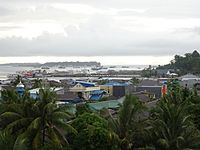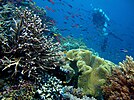Eastern Indonesia
This article needs additional citations for verification. (November 2023) |
Eastern Indonesia | |
|---|---|
| Kawasan Timur Indonesia[1] Indonesia Timur (in Indonesian) | |
|
From upper-left to lower-right: Diving experience in Piaynemo Island of Raja Ampat, Clitoria ternatea (the native flower of Ternate Island), Pura Ulun Danu Bratan, Bali (Bali's most popular Hindu temple) Papeda (the staple food of Eastern Indonesia) | |
 Eastern Region of Indonesia | |
| Largest city | Makassar |
| Provinces | 17 Provinces |
| Demonym | Eastern Indonesians[2] |
| Time zones | UTC+8 (Central Indonesia Time) |
| UTC+9 (Eastern Indonesia Time) | |
Eastern Indonesia (or East Indonesia)[3] is one of the two main geographical regions of Indonesia, the other being Western Indonesia.[1] Eastern Indonesia spans across the Banda and Maluku Seas in the west, the Arafura and Timor Seas in the south, and the Halmahera Sea in the north. It comprises the archipelagic territory of Tanimbar, Banda, Maluku,[4] Halmahera, Raja Ampat, Biak, and Western New Guinea. Central Indonesian Time and Eastern Indonesia Time are the national standard time designated for Eastern Indonesia; it falls within the UTC+8 and UTC+9 time zone, respectively.
Eastern Indonesia borders Southern Philippines in the Northwest, Palau in the North, Papua New Guinea in the East, and Northern Australia in the South.
History and background
[edit]During the last stages of the Dutch colonial era, the area east of Java and Kalimantan was known as the Great East and later known as Eastern Indonesia. After Denpasar Conference, on 24 December 1946, the State of East Indonesia was formed covering the same area, excluding Western New Guinea, previously included during Malino Conference. It was a component of the United States of Indonesia, and was dissolved into the unitary Republic of Indonesia in 17 August 1950.[5] Currently, Eastern Indonesia consists of 17 provinces: Bali, East Nusa Tenggara, West Nusa Tenggara, Central Sulawesi, Gorontalo, North Sulawesi, South Sulawesi, Southeast Sulawesi, West Sulawesi, Maluku, North Maluku, Central Papua, Highland Papua, Papua, South Papua, Southwest Papua, and West Papua.[6][7][8]
Geography
[edit]This section needs expansion. You can help by adding to it. (November 2023) |
Climate
[edit]In Eastern Indonesia, the days are generally dry and sunny from October through March with the warm tropical rain season occurring between May and August; temperatures are typically in the 27 °C (81 °F) to 30 °C (86 °F) range throughout the year.[4]
Administration
[edit]
Administratively, Eastern Indonesia consists of four main geographical units, namely the Lesser Sunda Islands, Sulawesi, Maluku Islands and Papua.
| ISO 3166-2 Codes | Geographical unit | Provinces | Population (mid-2022)[9] |
Largest city | Highest point |
|---|---|---|---|---|---|
ID-NU
|
Nusa Tenggara (Lesser Sunda Islands) | Bali, West Nusa Tenggara, and East Nusa Tenggara | 15,355,100 | Denpasar | Mount Rinjani
3,726 m (12,224 ft) |
ID-SL
|
Sulawesi | Central Sulawesi, Gorontalo, North Sulawesi, South Sulawesi, Southeast Sulawesi, and West Sulawesi | 20,304,400 | Makassar | Latimojong
3,478 m (11,411 ft) |
ID-ML
|
Maluku Islands | Maluku and North Maluku | 3,201,000 | Ambon | Mount Binaiya 3,027 m (9,931 ft) |
ID-PP
|
Papua | Central Papua, Highland Papua, Papua, South Papua, Southwest Papua, and West Papua | 5,601,900 | Jayapura | Puncak Jaya 4,884 m (16,024 ft) |
Economy
[edit]This section needs expansion. You can help by adding to it. (November 2023) |
Seaweed farming has traditionally been a common commercial activity along the coasts of Eastern Indonesia; however, in the 2020s climate change in Indonesia has been causing seaweed farmers in Eastern Indonesia to lose revenue and harvests.[10] In the consumer shopping industry, Eastern Indonesia experienced a rapid increase in online shopping in the 2020s, with overall transactions in the region doubling from 2020 to 2021; this growth has been led by Indonesian e-commerce company Tokopedia, with the top product types sold in the region being health and beauty, fashion, food and beverage, and electronics.[11]
Demographics
[edit]This section needs expansion. You can help by adding to it. (November 2023) |
Largest cities
[edit]The following are the four largest cities in Eastern Indonesia by population:
| No. | City | Province | Population | Image |
|---|---|---|---|---|
| 1. | Makassar | South Sulawesi | 1.571.814 | 
|
| 2. | Denpasar | Bali | 725.314 | 
|
| 3. | Manado | North Sulawesi | 478.192 | 
|
| 4. | Kupang | East Nusa Tenggara | 442.758 | 
|
| 5. | Mataram | West Nusa Tenggara | 452.812 | 
|
| 6. | Jayapura | Papua | 398.478 | 
|
| 7. | Palu | Central Sulawesi | 373.218 | 
|
| 8. | Ambon | Maluku | 347.288 | 
|
| 9. | Kendari | Southeast Sulawesi | 347.381 | 
|
| 10. | Sorong | Southwest Papua | 284.410 | 
|
See also
[edit]References
[edit]- ^ a b "Jejak Lensa Pembangunan Perhubungan Papua, NTB, NTT Kementerian Perhubungan Republik Indonesia". Kementerian Perhubungan Republik Indonesia (in Indonesian). Retrieved 2024-04-22.
- ^ Williams, Catharina Purwani (2007). Maiden Voyages: Eastern Indonesian Women on the Move. Netherlands: Koninklijk Instituut voor Taal-, Land- en Volkenkunde (KITLV) Press. p. 211. ISBN 9789812303943.
- ^ "President Jokowi: East Indonesia Will Be Able to Expand Rapidly, Need Supported by Infrastructure". Cabinet Secretariat of the Republic of Indonesia. 2015.
- ^ a b Lonne, Torben (March 23, 2018). "Essential guide to remote travel in eastern Indonesia". The Jakarta Post. Jakarta. Retrieved November 6, 2023.
- ^ Ricklefs 2008, pp. 362, 374.
- ^ Media, Kompas Cyber (6 March 2012). "13 Provinsi di Indonesia Timur Gelar Konsultasi Regional - Kompas.com".
- ^ Agency, ANTARA News. "BI Catat Bali Raih Inflasi Terendah KTI - ANTARA News Bali".
- ^ "Bawaslu Siap Kelola Keuangan Pilkada 2018 Secara Akuntabel - Badan Pengawas Pemilihan Umum Republik Indonesia". bawaslu.go.id.
- ^ Badan Pusat Statistik, Jakarta, 2023.
- ^ Barends, Jaya (July 23, 2023). "Seaweed farmers in eastern Indonesia struggle in a changing climate". Mongabay. West Seram. Retrieved November 6, 2023.
- ^ Paramitha, Pradna (December 29, 2021). "Western, central, and eastern Indonesia show diverse trends in online shopping behavior". Jakarta: The Jakarta Post. Retrieved November 6, 2023.
- ^ Indonesia
Bibliography
[edit]- Wouden, F.A.E. Van (1935). Types Of Social Structure In Eastern Indonesia (in English and Indonesian). Leiden: Springer Netherlands. p. 189. ISBN 9789401510769.
- Fraassen, C. F. van (1976). Drie plaatsnamen uit Oost-Indonesië in de Nagara-Kertagama: Galiyao, Muar en Wwanin en de vroege handelsgeschiedenis van de Ambonse eilanden [Three place names from Eastern Indonesia in the Nagara-Kertagama: Galiyao, Muar and Wwanin and the early trade history of the Ambon Islands] (in Dutch). doi:10.1163/22134379-90002645.
- Andaya, Leonard Y. (1993). The World of Maluku: Eastern Indonesia in the Early Modern Period. Honolulu: University of Hawaii Press. p. 306.
- Williams, Catharina Purwani (2007). Maiden Voyages: Eastern Indonesian Women on the Move. Netherlands: Koninklijk Instituut voor Taal-, Land- en Volkenkunde (KITLV) Press. p. 211. ISBN 9789812303943.
- Ricklefs, M. C. (2008). A History of Modern Indonesia Since C.1200. Macmillan Education UK. ISBN 978-0-230-54686-8.
External links
[edit]- "Banda Neira, Paradise in Eastern Indonesia". Ministry of Foreign Affairs Republic of Indonesia. 2021.




